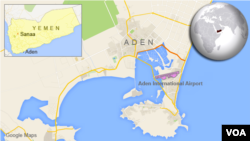After several days of intermittent clashes, Yemen's southern separatist forces appear to have recaptured strategic positions in the interim southern capital of Aden from forces loyal to President Abd-Rabbu Mansour Hadi. The separatists' latest defeat of Hadi's forces came amid accusations by his deputy foreign minister that Saudi-coalition partner the United Arab Emirates launched airstrikes against Hadi's forces on the ground, causing a number of casualties.
Arab media are reporting that fighters loyal to Yemen's southern separatist movement regained control Thursday of Aden after government forces temporarily recaptured strategic positions inside the city a day earlier.
Amateur video showed forces loyal to the government of internationally-recognized Yemeni President Abd-Rabbu Mansour Hadi battling the separatists inside Aden Wednesday, amid reports that they had temporarily taken control of the airport and the presidential palace, which the separatists seized several weeks ago.
Deputy Foreign Minister Mohammed al-Hadhramy said in a tweet Thursday that fighter jets from Saudi-coalition partner the United Arab Emirates had bombed forces loyal to Hadi in several places, causing a number of casualties. VOA could not independently confirm the accusation.
Aidarous al-Zubeidi, leader of the southern separatists and one-time governor of Aden under President Hadi, said in a televised address Wednesday that his side had acted in good faith by attending talks in the Saudi port city of Jeddah to iron out differences with President Hadi. He went on to say his men would regain control of strategic southern positions after a brief setback.
He says that President Hadi moved a large number of men into the south to try to retake Aden and appeared to be more interested in controlling the south of the country than in recapturing (the capital city of) Sana'a from the Houthi militia group.
The struggle to gain control of southern Yemen came amid news that the United States was now prepared to negotiate with the Houthis. Saudi Deputy Defense Minister Prince Khaled Ben Salman met with U.S. officials in Washington amid the apparent change in U.S. policy.
U.N. envoy Martin Griffiths told Saudi-owned al-Arabiya TV that he thought that the U.S. decision to talk to the Houthis would have a "positive effect" in trying to resolve the Yemeni conflict.
Paul Sullivan, a professor at the U.S. National Defense University, tells VOA that he fears that "forces to break (Yemen) apart are far greater than forces trying to keep it together as one country. Yemen is a textbook case of political and social entropy," he says. "(After) decades... of splits and breaks, it could completely shatter into numerous sharp pieces that could spread harm throughout the region..."
"If Yemen shatters," he adds, "and there is a section run by any Iran-backed groups... especially near a port, (Tehran) could have an almost permanent outpost to help with its hegemonic activities," creating a "constant low-grade threat" to Saudi Arabia, Egypt and the UAE.
Washington-based Gulf analyst Theodore Karasik argues that the UAE has been supporting the southern separatists in order to "get rid of (militias belonging to) the Muslim Brotherhood from the Islah Party, associated with the Hadi government." Karasik agrees with Sullivan that the UAE's strategy of supporting the separatists moves Yemen "further down a path to possible partition."





